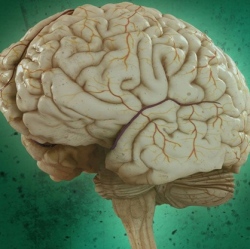
As we age, our brains naturally lose some of their volume, in other words, brain cells and connections. This atrophy, begins in our thirties and continues into old age. Researchers have known that patients with schizophrenia lose brain volume at a faster rate than healthy individuals, though the reason why is unclear.
Now, in a study published in the open access journal PLOS ONE, a team of researchers from the University of Oulu, Finland, and the University of Cambridge has identified the rate of decrease in both healthy individuals and patients with schizophrenia. They also documented where in the brain schizophrenia patients have more atrophy, and have examined links between atrophy and antipsychotic medication. By comparing brain scans of 33 patients with schizophrenia with 71 control subjects over a period of 9 years, from age 34 to 43, the researchers were able to show that schizophrenia patients lost brain volume at a rate of 0.7% each year. The control participants lost brain volume at a rate of 0.5% per year.
Scientists have previously speculated that antipsychotic medication used to treat schizophrenia may be linked to this decrease in brain volume. Today’s research confirms this association, showing that the rate of decrease in volume was greater when the dose of medication was higher. However, the mechanisms behind this, and whether it was in fact the medication that was causing this greater loss of tissue,are not clear. Some researchers have previously argued that whilst older antipsychotic medications might cause brain volume decreases, newer antipsychotic medications may protect against these decreases. However, today’s research suggests that both classes of antipsychotic medication are associated with similar declines in brain volume.
